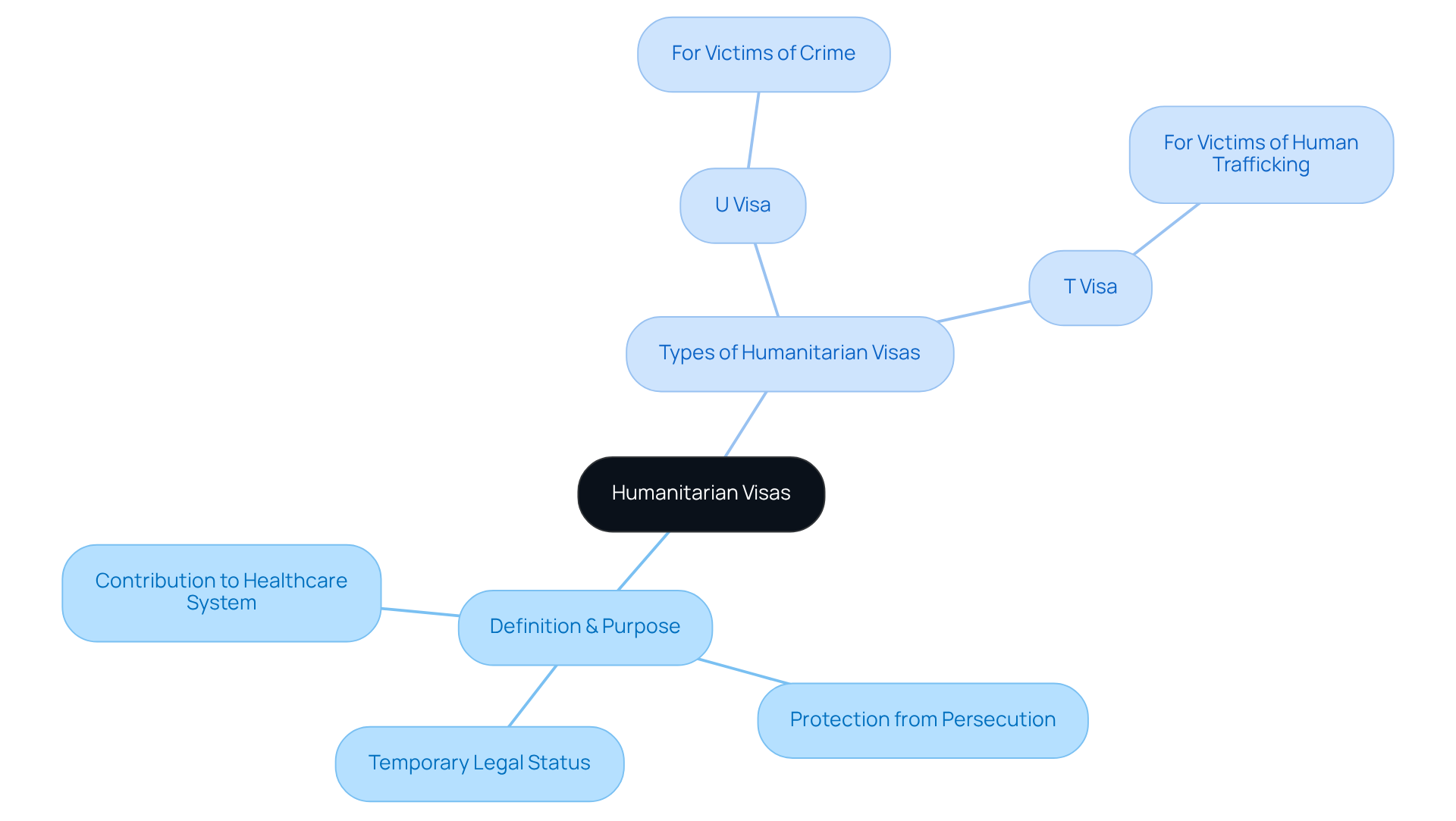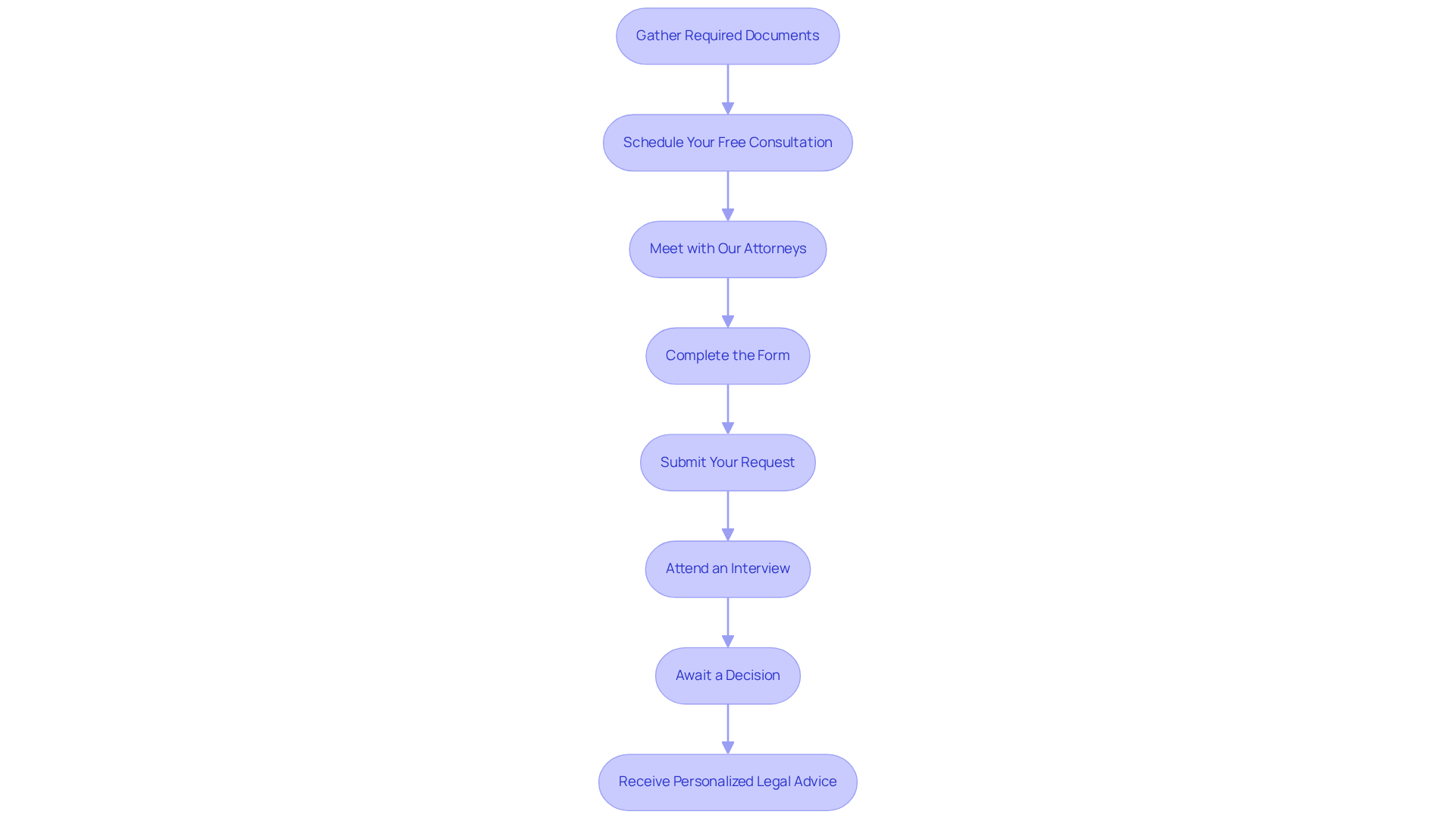Overview
This article serves as a practical guide for immigrant healthcare workers navigating the complex process of applying for humanitarian visas. It highlights the critical steps and considerations involved, emphasizing the importance of understanding eligibility, gathering necessary documentation, and effectively navigating the application process.
Have you ever felt lost in the immigration process? This guide is here to help. It details specific visa types and eligibility criteria, providing a clear, step-by-step approach to empower you in your journey.
We understand how overwhelming this feels. The article also addresses common challenges faced during the application process and underscores the value of legal representation, ensuring you have the support needed to enhance your chances of a successful application. Remember, you don’t have to face this alone—we’re in the fight with you.
Introduction
Navigating the complexities of humanitarian visas can feel overwhelming, especially for immigrant healthcare workers fleeing perilous situations. These visas provide not just a lifeline to safety but also allow these dedicated professionals to continue their essential roles within the U.S. healthcare system. Yet, the journey from understanding eligibility to successfully submitting an application is riddled with obstacles.
What steps can healthcare workers take to ensure their applications are not only complete but also compelling enough to secure the protection they urgently need? We understand how daunting this process can be, but you don’t have to face it alone—we’re here to fight for you.
Understand Humanitarian Visas: Definition and Purpose
Humanitarian visas are designed to provide temporary legal status for individuals escaping persecution, violence, or other life-threatening situations. For immigrant healthcare professionals, these permits represent a vital pathway to safety and stability in the United States. Understanding the purpose of humanitarian visas is essential; they not only offer protection but also allow individuals to work and contribute to our healthcare system.
This section will clarify the types of humanitarian visas available, such as:
- The U visa for victims of crime
- The T visa for victims of human trafficking
These humanitarian visas are crucial for healthcare professionals facing dire circumstances, ensuring they can find refuge and continue their important work.
We understand how overwhelming this process can feel, but it’s important to know that you have rights. We’re here to fight for you and guide you through every step.

Determine Eligibility: Who Can Apply for a Humanitarian Visa?
Applying for a humanitarian visa may seem overwhelming, but you don’t have to navigate this process by yourself. To qualify for a humanitarian visa, you must meet specific eligibility criteria, demonstrating that you have been victims of severe trafficking or have suffered significant harm due to criminal activity. For healthcare workers, this may involve being targeted for their profession or facing threats in their home countries. It’s crucial to gather evidence to support your claims, such as police reports or affidavits. Collecting all necessary documentation before proceeding is essential for a smooth submission process.
Legal representation can significantly boost your chances of a successful humanitarian visa application. At Vasquez Law Firm, we provide tailored assistance that considers your unique circumstances. To get started, follow these steps:
- Schedule your free consultation by contacting us.
- Discuss the details of your case with our attorneys.
- Obtain personalized guidance based on your situation.
- Understand your options moving forward.
Gathering the right documentation and seeking expert advice can greatly impact your submission process. Don’t hesitate—reach out to Vasquez Law Firm today to ensure you have the support you need. Remember, we’re in this fight with you.

Follow the Application Process: Step-by-Step Instructions
-
Gather Required Documents: Begin by collecting all necessary documentation. This includes proof of identity, evidence of eligibility, and any supporting letters from employers or community organizations. We understand how overwhelming this can feel, but having everything ready will set you on the right path.
-
Schedule Your Free Consultation: Reach out to Vasquez Law Firm to schedule your free consultation. This initial meeting is your opportunity to discuss your case details with our experienced attorneys who are here to help you navigate this process.
-
Meet with Our Attorneys: During your consultation, you will meet with our attorneys who will provide personalized legal advice tailored to your unique situation. Remember, you’re not alone in this fight.
-
Complete the Form: Fill out the appropriate form for the humanitarian visa you are applying for. Ensure that all information is accurate and complete. It’s crucial to get this right, as it impacts your application.
-
Submit Your Request: Send your completed form along with all supporting documents to the designated visa office. Be sure to keep copies of everything you submit. This step is vital for keeping track of your application.
-
Attend an Interview: If required, prepare for an interview with immigration officials. This may involve discussing your request and providing additional information. We understand this can be intimidating, but we’ll be with you every step of the way.
-
Await a Decision: After submission, monitor the status of your application. Be patient, as processing times can vary significantly depending on the type of visa and individual circumstances. Remember, we’re here to support you during this waiting period.
-
Receive Personalized Legal Advice: During your consultation, you will receive tailored legal advice from Vasquez Law Firm, helping you understand your options and the best course of action for your situation. Your future matters to us, and we’re committed to fighting for you.

Overcome Challenges: Troubleshooting Common Application Issues
-
Addressing Missing Documentation: If your request is delayed due to missing documents, it’s crucial to gather the required paperwork promptly and submit it as soon as possible. Keep a comprehensive log of all interactions with officials—this can be vital for monitoring your status and resolving any issues that arise. Remember, you’re not alone in this process.
-
Handling Application Denials: If your application is denied, take a moment to carefully review the reasons provided by the visa office. You may have the option to appeal the decision or reapply with additional evidence. Statistics show that many appeals succeed when new documentation is presented, highlighting the importance of thorough preparation. The Vasquez Law Firm boasts a 97% success rate in handling cases, underscoring how effective proper documentation and representation can be.
-
Overcoming Communication Barriers: Language can often pose challenges during the relocation process. If you encounter difficulties, consider seeking assistance from bilingual practitioners or community groups focused on immigration support. These resources can bridge communication gaps and ensure your submission is accurately represented. Remember, you have the right to remain silent and the right to an attorney during legal emergencies.
-
Seeking Emotional Support: The application process can be emotionally taxing. It’s essential to seek support from friends, family, or counseling services to manage anxiety and maintain focus on your goals. Engaging with support networks can provide the encouragement needed to navigate the complexities of the immigration system effectively. If urgent legal issues arise, the Vasquez Law Firm is available 24/7 to provide the guidance you need.

Conclusion
Navigating the humanitarian visa process is a crucial step for immigrant healthcare workers seeking safety and stability in the United States. These visas not only provide protection from persecution but also enable professionals to continue their vital contributions to the healthcare system. Understanding the purpose and types of humanitarian visas available is essential for those who qualify, as it opens doors to a future where they can thrive and serve their communities.
This guide has provided key insights, including:
- Eligibility criteria
- Necessary documentation
- A step-by-step application process
From gathering required documents to overcoming common challenges like application denials or missing paperwork, each stage of the process has been outlined to empower applicants. The importance of legal representation and emotional support has also been emphasized, highlighting the resources available to assist individuals in navigating this complex journey.
Ultimately, humanitarian visas signify more than just legal status; they represent hope and opportunity for those fleeing dangerous circumstances. By following the outlined steps and seeking the right support, immigrant healthcare workers can take proactive measures towards securing their future. Engaging with legal professionals and community resources will not only facilitate the application process but also provide the necessary encouragement to overcome obstacles. The journey may be challenging, but the possibility of a brighter tomorrow is worth the effort.
Frequently Asked Questions
What are humanitarian visas?
Humanitarian visas are temporary legal status permits for individuals escaping persecution, violence, or other life-threatening situations.
Who benefits from humanitarian visas?
Immigrant healthcare professionals benefit from humanitarian visas as they provide a vital pathway to safety and stability in the United States.
What is the purpose of humanitarian visas?
The purpose of humanitarian visas is to offer protection and allow individuals to work and contribute to the healthcare system.
What types of humanitarian visas are available?
The two main types of humanitarian visas available are the U visa for victims of crime and the T visa for victims of human trafficking.
How do humanitarian visas help healthcare professionals?
Humanitarian visas are crucial for healthcare professionals facing dire circumstances, ensuring they can find refuge and continue their important work.
Is the process of obtaining a humanitarian visa overwhelming?
Yes, the process can feel overwhelming, but individuals have rights and support available to guide them through every step.




